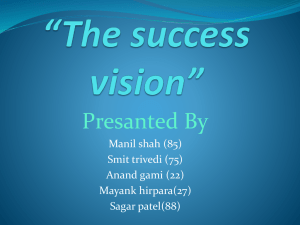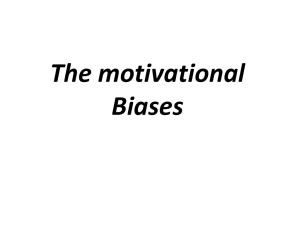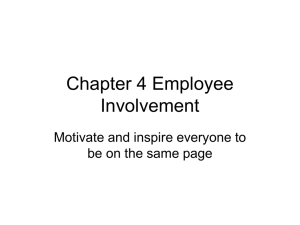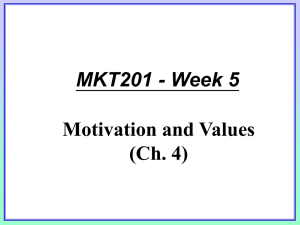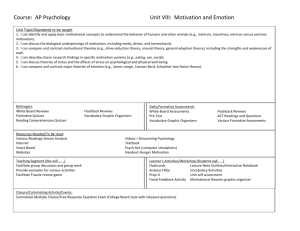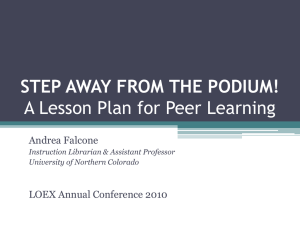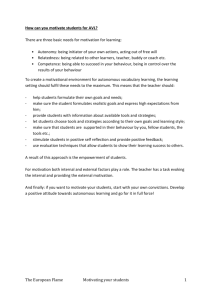Motivational Theory: Instructional Program
advertisement
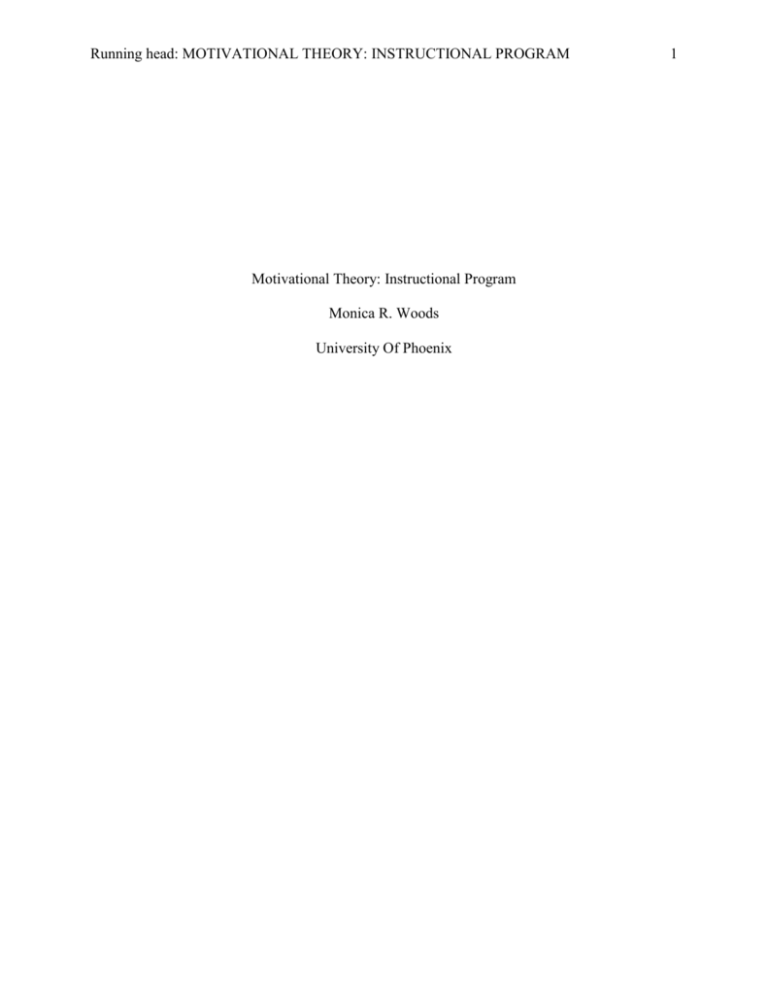
Running head: MOTIVATIONAL THEORY: INSTRUCTIONAL PROGRAM Motivational Theory: Instructional Program Monica R. Woods University Of Phoenix 1 MOTIVATIONAL THEORY: INSTRUCTIONAL PROGRAM 2 Motivational Theory: Instructional Program Introduction Research demonstrates the need for continued improvement in literacy proficiency across the country (NAEP, 2011). The students at Dayton Christian Elementary are at risk of being included in the National Assessment of Educational Progress (NAEP) report on reading, writing, and math proficiency. The NAEP report indicates fourth and eighth graders in the United States scored below proficiency level in reading with an average score of 66%, 67% in writing, and 63% in math (NAEP, 2011). The instructional program, Study Island, was analyzed to evaluate its continued integration into the curriculum in responding to intervention and improving reading, writing, and math skills. This paper is intended to examine the presence of theory-based motivational methods and the manner in which the strategies are used in the program. Motivational Strategies Present A variety of motivational strategies are used to increase student engagement within the program. Teachers a capable of providing performance-contingent rewards as students earn playing time when they complete tasks. Boggiano and Ruble (1979) suggests that in activities that offer performance-contingent rewards, perceived competence and performance are a greater focus on students than positive feedback. As a result, performance-contingent rewards increase the drive to do well, therefore, increasing student interest to complete tasks. Performancecontingent rewards dissipate negative effects often associated with performance assessments (Boggiano et al., 1986). Individual recognition has a great impact an individual’s quest to achieve. Study Island offers such intrinsic motivation as students work to reach certain levels in their performance. Marzano et al. (2001) agrees that when academic achievement occurs, and there is MOTIVATIONAL THEORY: INSTRUCTIONAL PROGRAM 3 personal recognition, a student's motivation to perform at a high level. Additionally, computerbased programs are seen to be inherently motivational as they are capable of including factors along the side of their learning environment, concurrently (Relan, 1992). Computer programs such as Study Island have flexible components that teachers can modify to align with the instructional sequence. The ability to differentiate according to individual learning styles and needs provide students with a strong sense of autonomy in their learning. Motivational Theory Application Motivation is defined as “an internal state that arouses us to act, pushes us in particular directions, and keeps us engaged in certain activities” (Ormrod, 2008, p. #). An individual’s motivation level is important in determining the length and depth of interest in an activity. Piaget believed that every experience and interaction in a child's life has an impact on cognitive development (Ormrod, 2008). Researchers suggest that every interaction establishes cognitive structure in children. The cognitive structure is very important in the classroom setting. Supporting the development of literacy in students require teachers to integrate some strategies. Using different motivational methods for instruction enhances the opportunity for student literacy motivation, focus, and practice. Study Island's design integrates researched education methodology. Methods incorporated include assessment feedback loops, close alignment with standards, distributed ongoing practice, and motivational features to guarantee that students are engaged in the activities and showing mastery Ohio standards and the Common Core Achievement Standards. The design of Study Island uses continuous analysis of Ohio standards to ensure content updates that allow teachers the ability use assessments to inform instruction. Teachers relate instructional practice and assessment results to produce continuous feedback loops (studyisland.com, 2015). Professional development videos and webinars are available for MOTIVATIONAL THEORY: INSTRUCTIONAL PROGRAM 4 educators to maximize instructional and management skills. Study Island teacher tools promote opportunities for reflection between modules. Teachers are encouraged to be self-motivated learners and spend time working through the program to create a learning environment that will assist in the acquisition of skills that will enhance instruction and the school. Motivational Specialist As a motivational specialist within the school, it is the recommendation that the Board of Education for the Dayton Christian School System consider the following changes to improve the impact of the program. As essential as motivation is for learning, teachers should be mandated to participate in a variety of professional development sessions focused on the content of Study Island and designing instruction that motivates student use. Study Island offers some online and site-based opportunities to increase teacher knowledge in integrating and designing instruction that includes the Study Island program (studyisland.com, 2015). If the governing board members invested in the future of learning for students, effective implementation of instructional tools must be a priority. Proper training for teachers to interpret assessments and response to intervention and motivation for student achievement is key to increasing understanding and comprehension in reading, writing, and math. Continual professional development must take place for teachers to increase their knowledge and skills. Teachers must constantly evaluate and change instructional methods to address the learning needs of all students. Maximizing the integration of learning tools such as Study Island can also be accomplished by holding teachers accountable for effective integration of the program through classroom observations by the administrators. Observations must be followed up with meetings that give opportunities for teachers to collaborate. Teachers should share successes, difficulties, and other features teachers find that add to the effective integration of the program. MOTIVATIONAL THEORY: INSTRUCTIONAL PROGRAM Conclusion In conclusion, early indicators reveal that standardized testing and assessments will continue to increase in difficulty and become challenging for teachers, administrators, and students. To address the challenges, Study Island will continue to redesign and update the content to align specifically with state standards. Study Island provides the symbolic motivational strategies, active animation, and teacher tools that allow for flexibility and motivational methods to enhance instruction (studyisland.com, 2015). The student will benefit from continuous goal setting, and task-specific feedback while meeting standards. Teachers get diagnostic, formative and summative assessment results, and professional development tools to modify instruction to meet the student's learning needs (studyisland.com, 2015). 5 MOTIVATIONAL THEORY: INSTRUCTIONAL PROGRAM 6 References Edmentum Products. (2015). Study island. Retrieved from http://www.studyisland.com/ Boggiano, A. K., and Ruble, D. N. (1979). Competence and the overjustification effect: A developmental study. Journal Of Personality And Social Psychology. Marzano, R. J., Pickering, D. J., and Pollock, J. E. (2001). Classroom instruction that works: Research-based strategies for increasing student achievement. Alexandria, VA: Association for Supervision and Curriculum Development. National Center of Education Statistics, Institute of Educational Science. (2011). National Report Card. Retrieved from http://nces.ed.gov/fastfacts/index.asp?faq=FFOption1#faqFFOption1 Ormrod, J. E. (2014). Human Learning, 7th Edition. [VitalSource Bookshelf version]. Retrieved from http://legacy.vitalsource.com/books/9781323145210/epubcfi/6/20 Relan, A. (1992). Motivational strategies in computer-based instruction: Some lessons from theories and models of motivation. Eric. Retrieved from http://eric.ed.gov/?id=ED348017 MOTIVATIONAL THEORY: INSTRUCTIONAL PROGRAM 9.65 10 Possible Points Individual: Motivational Theory 7 Feed Forward As you continue in this degree program the lessons learned in this course should carry over in all your educational experiences. Keep them in mind as you go through all your sources and recognize the applications of each. Doctoral Paper Grading Rubric Criteria Percents Possible Points Points Earned Depth Of Scholarship 10% 1 1 Word count range: 750-1200 0.25 0.25 Revised information for the Critical Analysis PowerPoint presentation to include motivational theories and theorists already exiting in the program. 0.25 0.25 Showed how to add motivational theory information in the program to improve the program. 0.25 0.25 How would you change the program to incorporate more motivational theory information? 0.25 0.25 1.5 1.5 Demonstrated originality of thought in proposed analysis 0.5 0.5 Enlarged upon previous authors’ points of view. 0.5 0.5 Indicated ways that one might be able to better implement motivational methods into the program 0.5 0.5 1.5 1.5 0.75 0.75 0.75 0.75 1.5 1.5 Supported the assertions of needed changes with peer- reviewed literature. 0.75 0.75 Used appropriate, timely, and adequate literature. 0.75 0.75 Comment Assignments should represent the learner’s careful, thoughtful efforts to cover the key elements of the topic thoroughly. Content should go beyond mere description or regurgitation. The work should be thematic and based on an analytical framework of the learner’s choosing. Key Elements Originality of ideas and research Theoretical and conceptual framework 15% 15% Contributed substantive value to the understanding of the information provided Related the theories and concepts to the analysis Use of literature 15% The elements of this assignment were covered thoughtfully and thoroughly. You demonstrated how motivational theories can be integrated into the program you analyzed. Well done! Your work demonstrates your understanding of the concepts discussed in this course and how some can be applied in the evaluation or development of any program. You demonstrated an understanding of the course learning and the practical application of these theories into the program analyzed. Again, you demonstrate good integration of the course textbook information. MOTIVATIONAL THEORY: INSTRUCTIONAL PROGRAM Substantive value 15% 1.5 1.5 Contributed substantive value to the understanding of the concepts discussed based on course learning 0.75 0.75 Presented information in a manner that would convince others of the point of view established. 0.75 0.75 Clarity and logic of presentation 10% 1 1 Utilized a strong organizational structure. 0.5 0.5 Covered the facts in a logical and consistent manner. 0.5 0.5 2 1.65 Sentences, paragraphs structures and words used add to the organization of the document. 0.7 0.6 Followed all rules governing grammar, spelling, and standard usage of American English. 0.65 0.6 Followed all formatting guidelines of APA 65th ed. 0.65 0.45 10 9.65 Grammar and adherence to APA format Total Score 20% 8 Your work did demonstrate your understanding of the concepts discussed in this course and how they can be applied in the evaluation or development of any program. Good organizational skills makes it easy for the reader to follow along with your thoughts and ideas. Good introduction and summary sections. Review all comments embedded in the paper. Pay attention to APA guidelines. 100%
